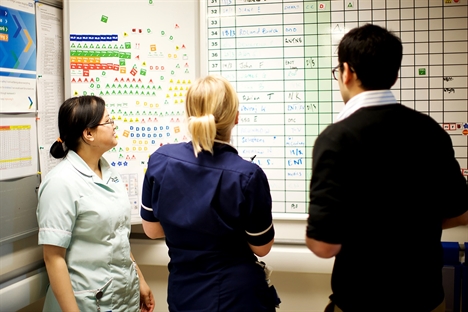13.06.17
Piecemeal workforce policymaking is failing the NHS
Source: NHE May/Jun 17
Anita Charlesworth, director of research and economics at the Health Foundation, explains why the NHS will not be able to fulfil its efficiency goals without a serious examination of its approach to pay and the way it plans and uses its nursing workforce across the system.
Health and social care are both people businesses: the NHS employs over 1.3 million people and the social care system even more. A successful and sustainable health and social care system relies on the ability to recruit, retain and mobilise the workforce needed to deliver the best possible care.
But poor workforce planning is one of the Achilles heels of the NHS. We are still not training enough nurses, doing too little to stop nurses leaving, and there seems to be no plan for pay policy following what will be almost a decade of pay restraint. On top of this, the impact of Brexit means that international recruitment – the health service’s usual get out of jail free card for staff shortages – is at risk.
Staff cost remains the largest area of spending and financial pressure for NHS providers. Delivering the £22bn of efficiency savings set out in the NHS Five Year Forward View is not primarily about back-office or procurement savings. It requires sustained growth in labour productivity and tackling the endemic problem of variation between the most and least productive trusts. An effective strategy for the recruitment, retention and productivity of the NHS workforce will be vital.
Recent Health Foundation research, ‘A year of plenty?’, suggests that the NHS has a long way to go to realise the power and potential of its people. The last six years have seen big changes in the NHS workforce. Overall, the workforce grew by 11,500 staff between March 2010 and March 2016 – an increase of just 1%. But the pattern of growth over this period has not been even. The number of consultants increased by more than 20%, while the number of nurses lagged well behind with an increase of just 1%, and the number of GPs fell.

Productivity falling
Productivity for consultants and the wider workforce in acute hospitals has been falling. Our work found hospital consultant productivity fell by an average of 2.3% a year between 2009-10 and 2015-16. Research in the BMJ by John Appleby has found a similar reduction. This fall in productivity is the result of rapidly rising consultant numbers but more modest rises in their output.
Falling productivity doesn’t mean that people in the NHS aren’t working incredibly hard – they are. People work in teams and systems, if they are not supported properly by these systems they will not be as productive as they could be, no matter how hard they work. This is bad for finances and bad for morale. There may be good reasons for the growth in numbers of consultants, but the NHS is not using their skills well. Consultant productivity rates vary across the NHS and when we explored what factors were associated with higher productivity, our research showed that skill mix within clinical teams matters. Higher rates of nurse staffing levels are associated with improved consultant productivity. This raises further questions about the decision to continue to increase doctor – and particularly consultant – numbers at a much faster rate than nurses.
We also found that relative pay matters for productivity, reinforcing our worry about the government placing too much reliance on pay restraint to achieve financial balance.
Nurses and pay must be high on agenda
Whatever the outcome of the election, the issues of nursing shortages and the future of pay policy must be high on the agenda of the next government. In 2015, England had a shortfall of 22,000 nurses specialising in adult patient care – almost 10% of the adult nursing workforce.
Current workforce plans offer no prospect of this being resolved shortly. Even under the most optimistic scenario for the supply of nurses, a shortage of 14,000 nurses specialising in adult patient care is expected in 2020. Under the more pessimistic scenario, the shortfall will be 38,000. Concerns about nursing shortages are borne out by people working at the frontline. New analysis of the 2016 NHS staff survey shows that almost half of all nurses are concerned that there aren’t sufficient staffing levels to allow them to do their job properly.
Between 2010 and 2017 the real value of the pay of people working in health and social care has fallen by 6%, compared to a more modest fall of 2% for real-terms pay in the economy as a whole. As NHS Providers has said, ‘this cannot go on indefinitely’. The next government needs to prepare the pay determination system for the ‘end of the freeze’ on national pay. There must be a thorough, independent review to assess the options to determine the total reward package for NHS staff.
Piecemeal workforce policymaking, however well intentioned any initiative might be, is not serving the NHS well. The NHS can’t deliver sustained efficiency improvements and transform services without a serious examination of its approach to pay and the way it plans and uses its nursing workforce across the system.
FOR MORE INFORMATION
The Health Foundation’s ‘A year of plenty?’ report can be accessed at:
W: www.health.org.uk/publication/year-of-plenty